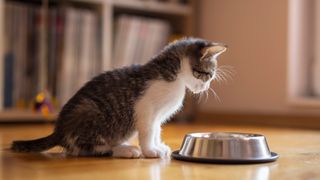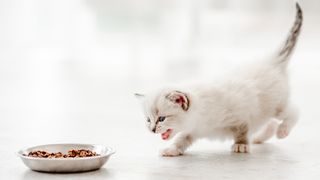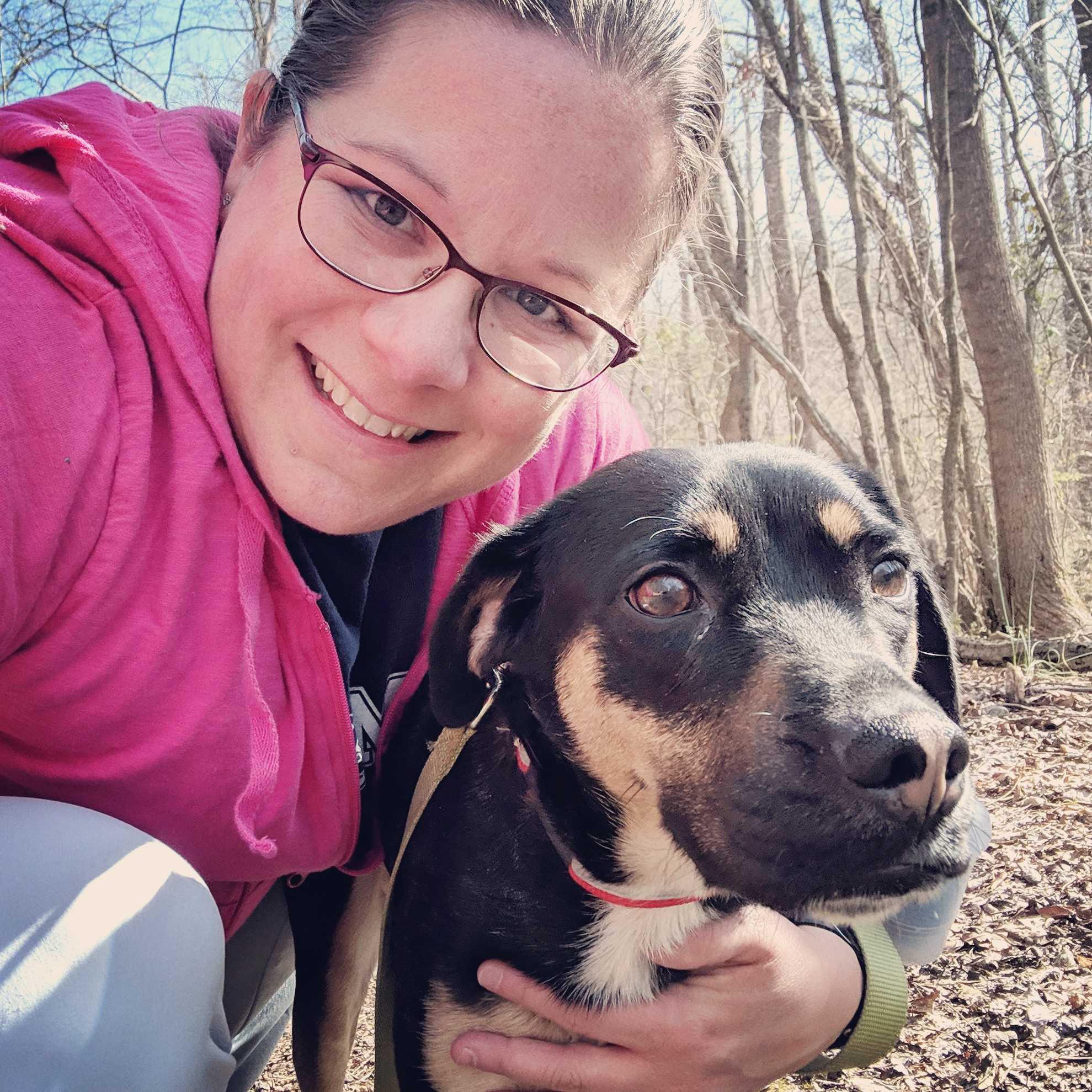How much food should a kitten eat?
An expert vet offers advice for anyone wondering how much food should a kitten eat

When caring for cat, we often ask ourselves “how much food should a kitten eat?”. After all, you don’t want to under or overfeed your feline friend. Instead, you simply want to provide enough nutrients to meet your cat’s needs and ensure they have a healthy start to life.
There is, however, no simple answer. We can’t just say, a cup of food a day. Or half. Or a quarter. Or two. It depends on your kitten’s size and age as well as the specific kitten food you are feeding. You also need to take into account medical conditions, kittens with a slower metabolism and how active a kitten is proving to be – the more active, the more calories they’ll need.
In this guide, then, we’re going to be looking at working out the appropriate quantities of the best kitten food you will need for your moggy to minimize obesity and prevent nutritional deficiencies. You should also work closely with a veterinarian in combination with some trial and error to determine how much food a kitten should eat.
What do kittens eat?
As you’ve likely worked out, the best meals to give kittens are those made by pet food manufacturers. The important thing is to ensure the food is specifically formulated to be complete and balanced for your kittens needs and that the meals are adhering to the Association of American Feed Control Officials (AAFCO) nutritional profiles. This organisation, which regulates pet food in the United States, has established profiles for three separate life stages: pregnancy/nursing, growth and maintenance.
First, if you look for the Nutritional Adequacy Statement on the food label, you can see if the diet is formulated for kitten growth. This is important. You can’t give adult cat food to a kitten under a year old because it can lead to nutritional deficiencies. You can’t feed a kitten the best wet dog food either since it’s a surefire path to potentially life-threatening taurine deficiency.
Second, it’s important to consider quality. The World Small Animal Veterinary Association recommends carefully evaluating pet food manufacturers based on whether:
- the company employs a veterinary nutritionist
- the diet is formulated by a nutritionist
- the company conducts regular quality control testing
- the company performs ongoing nutritional research.
Your veterinarian will be familiar with many pet food manufacturers and can help you separate fact from fiction when assessing a particular kitten food.

How much food should a kitten eat?
As well as knowing the top six kitten feeding tips for raising a strong and healthy cat, the two most important indicators for ensuring your cat is eating properly are your kitten’s age and the nutrient density of the diet you’re feeding.
Young kittens need far less energy for growth than an older kitten, for example. Depending on the particular kitten food that you are feeding, a six-week-old kitten may eat as little as ¼ cup of food per day. In contrast, a 10-month old kitten may require over one cup of food per day.
The quality of that food then comes into play. Kitten foods can differ in caloric density and nutrient concentration. Just like humans have to vary food intake based on caloric density (one cup of ice cream contains far more calories than one cup of green beans!), so kitten diets are influenced by the actual food itself.
The best way to determine how much to feed your kitten is to review the feeding chart present on every bag or can of kitten food. This feeding chart will provide specific feeding instructions, based on your kitten’s current age and/or weight. Each food has a different feeding chart, because feeding charts are calculated based on the specific food’s caloric/nutrient density.
How do I know when my kitten is full?
Kittens typically regulate their own food intake. Most kittens eat when they are hungry and stop eating when they are full - however, a kitten not eating at all or eating very little warrants a trip to the vet.
If you have the opposite problem and your kitten finishes their food and still appears ravenously hungry, you may need to increase the amount that you are feeding them. If you find that you are feeding significantly more than what is recommended on your food’s feeding guide and your kitten still appears hungry, talk to your veterinarian. Some medical conditions may increase your kitten’s nutrient requirements, and your veterinarian can help you determine whether additional testing is needed.
Because young kittens have a small stomach, it’s difficult for them to eat a large amount at one time. Therefore, it’s typically best to divide your kitten’s recommended daily food intake into two or three smaller meals each day. We also have a vet's answers to the popularly asked question “how often should I feed my kitten?” and you can discover the answer to the question “when can kittens eat dry food” as well.
Can you overfeed a kitten?
Yes, it is possible to overfeed a kitten. Excessive food intake in young kittens can contribute to vomiting and diarrhea – although check with your vet that diet is to blame because gastrointestinal issues in young kittens can also have a number of other causes.
In older kittens, overfeeding can contribute to obesity which can predispose your cat to medical conditions and shorten your cat’s lifespan. Work with your veterinarian to ensure that your kitten remains within a healthy weight range as they move into adulthood.
If you have any additional concerns, talk to your veterinarian for more personalized recommendations.
PetsRadar Newsletter
Get the best advice, tips and top tech for your beloved Pets
Dr. Barnette is a graduate of the University of Florida, where she received both her B.S. in Zoology and her Doctor of Veterinary Medicine (DVM). She has 15 years of clinical experience as a small animal veterinarian, treating dogs, cats, and occasional exotic patients. She now works as a freelance veterinary writer, creating educational content for veterinarians, veterinary team members, and dedicated pet owners. Dr. Barnette lives in southwest Florida with her husband and daughter (plus two cats, a dog, and a rescued dove!) and enjoys kayaking, biking, and hiking. Learn more about Dr. Barnette at www.linkedin.com/in/catherinebarnette.

